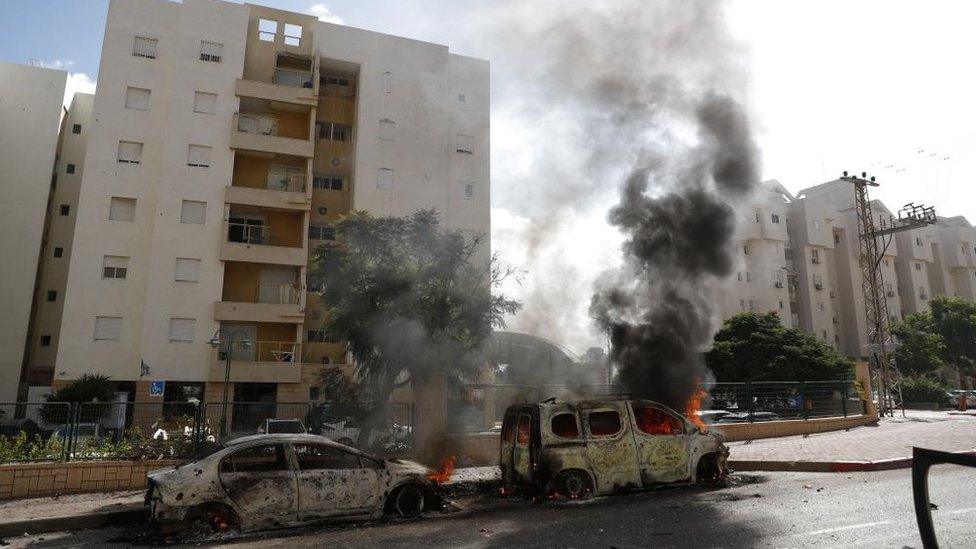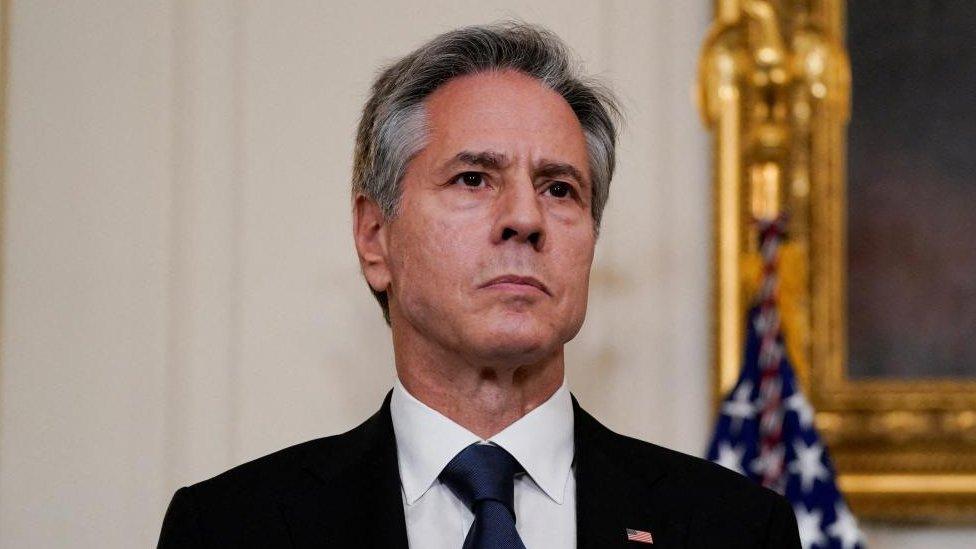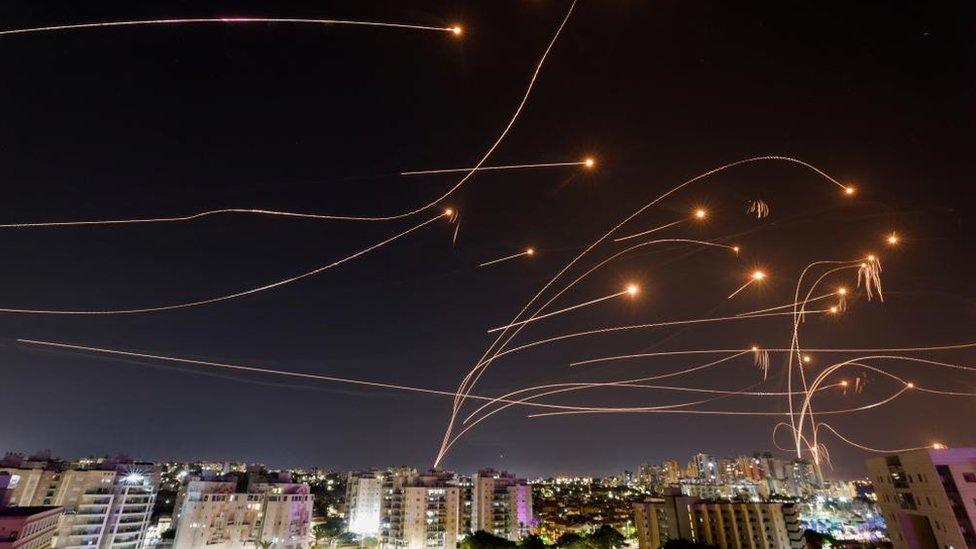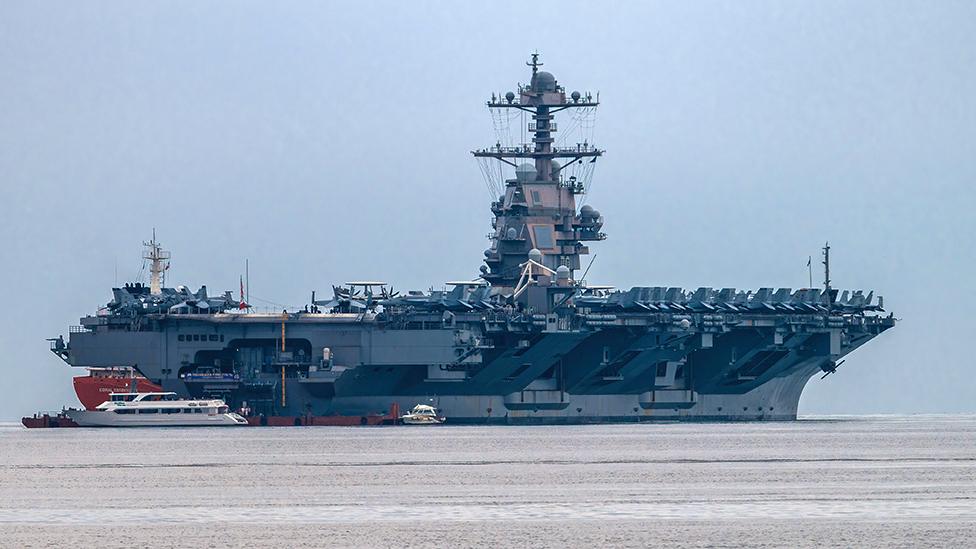Did Iran support plan for attack on Israel?
- Published

Iran has celebrated and praised the attacks on Israel but denies any involvement
Questions about the involvement of Israel's arch-enemy Iran are already being asked in the wake of the deadly assault by Hamas on Israeli communities around the Gaza Strip.
A report in the Wall Street Journal quotes unnamed members of Hamas and the Lebanese guerrilla movement Hezbollah as saying that Iran gave the go-ahead for the attack a week ago.
But a senior defence official in Washington later said that the US had "no information at this time" to corroborate specific allegations of an Iranian role in the attacks.
Regardless, the stakes on the truth of this are high. If it emerged that Iran was behind the attacks, it could widen the conflict into a regional confrontation.
So while Iran's leaders have celebrated and praised the attacks, they have been quick to deny involvement.
"The accusations linked to an Iranian role… are based on political reasons," Iran's Foreign Ministry said.
Iran did not intervene "in the decision-making of other countries", a spokesman added.
But none of this means Iran wasn't involved.
The US says it had "not yet" seen evidence Iran was behind the attacks. However, Secretary of State Antony Blinken noted that "there is certainly a long relationship".

Secretary of State Antony Blinken said Washington had not yet seen evidence that Iran was behind this attack
Tehran has been one of Hamas' main sponsors for many years, providing it with financial assistance and vast quantities of weaponry, including rockets.
Israel has spent years trying to disrupt Iran's supply routes to Gaza, which involve Sudan, Yemen, ships in the Red Sea and Bedouin smugglers in the lawless Sinai Peninsula.
As one of Israel's most implacable foes, Iran clearly has a vested interest in seeing the Jewish state suffer.
"I would say that it's not too much to assume that Iran is involved," Haim Tomer, a former senior officer with Israel's foreign intelligence agency, Mossad, told the BBC.
"This is the response of Iran to reports that a peace treaty is going to happen between Israel and Saudi Arabia."
But Mr Tomer said he found the suggestion that Iran actually ordered Saturday's attack "a little bit cumbersome".
"Yes, it's true that Iran is the number one provider of equipment to Hamas," he said, "and that they were training them in Syria and even, reportedly, in Iran."
Israel, he said, had been watching the movement of Hamas officials in recent months.
"We have seen people like Saleh al-Arouri (head of the organisation's military wing) and other Hamas leaders flying back and forth between Lebanon and Iran, holding meetings, including with [Supreme Leader Ayatollah] Khamenei himself."
But this "intimate relationship" was not enough, Mr Tomer said, to explain the timing of the attack.
"Hamas was very much tuned to the inner conflict in Israel," he said.
"Iran sustains and supports every logistic and military aspect, but I think the decision was at least 75% an independent decision by the Hamas leadership."

There have been continued rocket attacks on Israel from the Gaza Strip
Raz Zimmt, an Iran expert at Tel Aviv University, agrees.
"This is a Palestinian story," he posted on social media today.
According to the Wall Street Journal, Iran gave the green light for the attack at a meeting in Beirut last Monday.
Unnamed Hamas and Hezbollah sources told the newspaper that officers from Iran's Islamic Revolutionary Guard Corps had worked alongside Hamas since August to put together Saturday's complex air, land and sea operation.
Videos of the Hamas attack pointed to a level of sophistication far beyond the organisation's mostly crude attempts in the past to breach Israel's security fence surrounding the Gaza Strip.
The simultaneous use of rockets, drones, vehicles and powered hang-gliders suggested that the operation's planners had studied other recent examples of hybrid warfare, perhaps including Ukraine.
But the decision to attack, Mr Raz said, was taken "by Hamas, based on its own interests, arising from the Palestinian reality".
"Did Hamas use Iranian aid? Definitely, yes. Did Iran have an interest in this action? Yes. Does Hamas need Iranian permission to operate? No."
Hamas has been developing its elite units for several years, says Haim Tomer, the former Mossad official.
"But still they performed above their former level," he said.
Israeli officials are now looking north and south as they figure out what happens next and whether Iran's involvement could become more overt.
Iran's Lebanese ally, Hezbollah, has already launched two small-scale attacks into the Israel-occupied Golan Heights. The Israeli military says it has used helicopters to hit targets inside Lebanon.
"The Hamas operation is a reality-changing event in the Middle East that may oblige Iran to move from the phase of ongoing support and co-ordination to a more direct involvement, especially if the Israeli response poses a significant challenge to Hamas," Mr Raz said.

More on Hamas-Israel attacks

Related topics
- Published27 February

- Published9 October 2023
